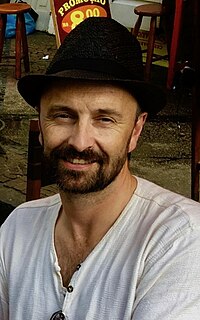The o'nyong'nyong virus (ONNV) was first isolated by researchers at the Uganda Virus Research Institute in Entebbe, Uganda, during a large outbreak of a disease in 1959 that resembled dengue fever. ONNV is a togavirus, genus Alphavirus, is closely related to the chikungunya and Igbo Ora viruses, and is a member of the Semliki Forest antigenic complex. The name was given to the disease by the Acholi tribe during the 1959 outbreak. The name comes from the Nilotic language of Uganda and Sudan and means “weakening of the joints". The virus can infect humans and may cause disease.

Schistosoma haematobium is a species of digenetic trematode, belonging to a group (genus) of blood flukes (Schistosoma). It is found in Africa and the Middle East. It is the major agent of schistosomiasis, the most prevalent parasitic infection in humans. It is the only blood fluke that infects the urinary tract, causing urinary schistosomiasis, and is the leading cause of bladder cancer. The diseases are caused by the eggs.

Major-General Sir David Bruce was an Australian-born British pathologist and microbiologist who made some of the key contributions in tropical medicine. In 1887, he discovered a bacterium, now called Brucella, that caused what was known as Malta fever. In 1894, he discovered a protozoan parasite, named Trypanosoma brucei, as the causative pathogen of nagana.

Andhra Medical College is in Visakhapatnam, Andhra Pradesh, India, and affiliated to NTR University of Health Sciences. It is the oldest medical colleges in Andhra Pradesh, and the sixth oldest in India. It is recognized by the Medical Council of India. Dr. P. Shyam Prasad is the present vice chancellor.
Ponduri Venkata Ramana Rao was an Indian microbiologist. He was born at Rajupalem in Ongole district, Madras Presidency, British India.
Tamunoemi Sokari David-West was a Nigerian academic, social critic, and federal minister.

Alexandre Joseph Émile Brumpt was a French parasitologist.
Sir James Beveridge Thomson, KBE, SMN, PMN, PJK, was a Scottish jurist and barrister who was the Chief Justice of the Federal Court of Malaysia. He was also Chief Justice of Fiji.

Sir Gordon Covell was a physician and a major general in the army of British India, and a leading global expert on Malaria disease control and eradication efforts in the middle of the 20th century. He was member of the expert committee on malaria set up by the WHO from 1948 to 1958, of which he served as the secretary. At that time, he was also an advisor to the British Ministry of Health and the Director of the Malaria Laboratory at Horton Hospital.

Pyotr Fokich Borovsky was Russian and Soviet surgeon and public health administrator of who worked in Tashkent, professor of surgery in Tashkent Medical Institute.
Vasant Ramji Khanolkar, better known as V. R. Khanolkar, was an Indian pathologist.
Air Marshal Sir Harold Edward Whittingham was a British physician notable for a distinguished medical career in the Royal Air Force and contributions to Aviation medicine. After graduating from the University of Glasgow, he was the first pathologist and Assistant Director of Research at the Beatson Institute for Cancer Research in Glasgow.

Henry Roy Dean, MD, LL.D, D.Sc, FRCP, also known as Prof. H. R. Dean, was a professor of Pathology at the University of Cambridge and Master of Trinity Hall, Cambridge.
Transactions of the Royal Society of Tropical Medicine and Hygiene is a monthly peer-reviewed medical journal covering all aspects of tropical medicine. It is the official journal of the Royal Society of Tropical Medicine and Hygiene and is published by Oxford University Press. According to the Journal Citation Reports, the journal has a 2018 impact factor of 2.820.

Idupuganti Bhooshana Rao was a leading figure in forensic medicine in India. He was the Founding-President of the Indian Academy of Forensic Medicine established in 1972. He was born in Dornakal, Andhra Pradesh, India.
Herbert Michael Gilles was a Maltese-British physician and professor of tropical medicine, recognized as a leading expert in his field.

Percy George Shute was an English malariologist and entomologist who worked at the Mott Clinic at the Horton Hospital in Essex which was also known from 1952 to 1973 as the Malaria Reference Laboratory.

John Russell Stothard is a British scientist, professor of parasitology at Liverpool School of Tropical Medicine, and well known for his teaching and research into schistosomiasis and neglected tropical diseases. He was the recipient of the Bicentenary Medal of the Linnean Society of London in 2004, and the C.A. Wright Memorial Medal of the British Society for Parasitology in 2019. He has previously held positions at London’s Natural History Museum, London School of Hygiene and Tropical Medicine, and at Imperial College London between 1992 and 2010.

Rupert Montgomery Gordon was a British professor of parasitology and entomology at the Liverpool School of Tropical Medicine. He worked on rickettsial, protozoal, and metazoan parasites and their vectors.
Stuart Bergsma was an American psychiatrist, medical missionary, and author. He served with the United Presbyterian Church of North America in Ethiopia and India, with periods between spent practicing medicine in the United States. In India Bergsma was superintendent of a hospital at Ludhiana, Punjab. He wrote on the phenomenon of speaking in tongues, which he connected to emotional stress or a desire to raise the patient's social standing.










